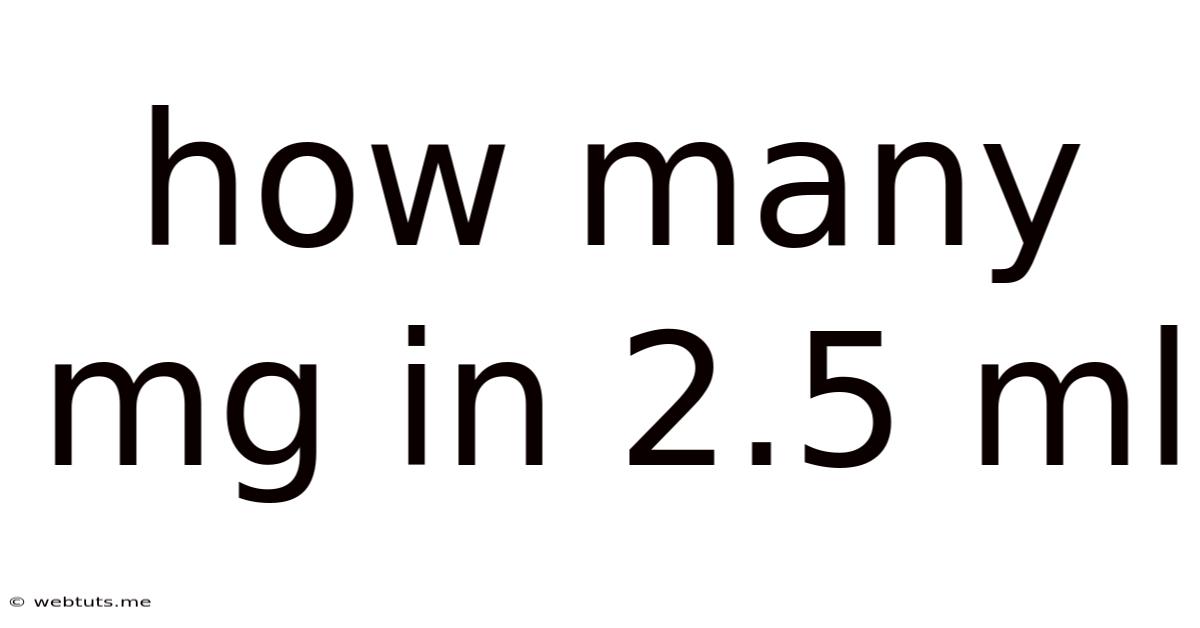How Many Mg In 2.5 Ml
Webtuts
May 13, 2025 · 4 min read

Table of Contents
How Many mg in 2.5 ml? Understanding Concentration and Conversions
Determining how many milligrams (mg) are in 2.5 milliliters (ml) requires knowing the concentration of the substance in question. There's no single answer; the conversion depends entirely on the density or concentration of the solution. This article will delve into the intricacies of this conversion, explaining the underlying principles, providing examples, and highlighting the importance of accurate calculations, especially in medical and scientific contexts.
Understanding Concentration: The Key to Conversion
Concentration refers to the amount of solute (the substance being dissolved) present in a given amount of solvent (the substance doing the dissolving) or solution (the solute and solvent together). Concentration is typically expressed as a ratio, often as:
- mg/ml (milligrams per milliliter): This is the most common unit for expressing concentration and is ideal for this conversion. It directly tells you how many milligrams of a substance are in one milliliter of solution.
- g/L (grams per liter): Another common unit, easily convertible to mg/ml.
- % w/v (weight/volume percentage): Represents the grams of solute per 100 ml of solution.
- Molarity (M): Expresses concentration in moles of solute per liter of solution. This requires knowing the molar mass of the substance.
Calculating mg from ml: The Formula and Process
Once you know the concentration, the calculation is straightforward:
mg = concentration (mg/ml) × volume (ml)
Let's break down how this formula works:
- Concentration (mg/ml): This is the crucial piece of information. It tells you the amount of solute (in mg) present in one milliliter of the solution.
- Volume (ml): This is the volume of the solution you are working with (in this case, 2.5 ml).
Example 1: A Simple Solution
Let's say you have a solution with a concentration of 100 mg/ml. To find out how many mg are in 2.5 ml, you'd calculate:
mg = 100 mg/ml × 2.5 ml = 250 mg
Therefore, there are 250 mg in 2.5 ml of this specific solution.
Example 2: Converting from Different Concentration Units
Suppose the concentration is given as 10 g/L. First, you need to convert this to mg/ml:
- Convert grams to milligrams: 10 g = 10,000 mg
- Convert liters to milliliters: 1 L = 1000 ml
- Calculate the concentration in mg/ml: 10,000 mg / 1000 ml = 10 mg/ml
Now, you can use the formula:
mg = 10 mg/ml × 2.5 ml = 25 mg
In this case, there are 25 mg in 2.5 ml of the solution.
Example 3: Working with Percentage Concentrations (% w/v)
If the concentration is given as 5% w/v, this means 5 grams of solute are present in 100 ml of solution. The conversion to mg/ml is as follows:
- Convert grams to milligrams: 5 g = 5000 mg
- Calculate the concentration in mg/ml: 5000 mg / 100 ml = 50 mg/ml
Then, apply the formula:
mg = 50 mg/ml × 2.5 ml = 125 mg
Thus, there are 125 mg in 2.5 ml of this 5% w/v solution.
Importance of Accuracy and Precision
Accurate calculation of mg from ml is paramount in various fields:
1. Medicine and Pharmacology
Inaccurate dosages can have serious consequences. Medical professionals rely on precise calculations to administer the correct amount of medication. Errors in converting between ml and mg can lead to underdosing (ineffective treatment) or overdosing (potentially toxic effects). This is especially critical with potent drugs.
2. Analytical Chemistry and Laboratory Work
Accurate concentration determination is essential for reliable experimental results. Incorrect conversions can lead to flawed data analysis and unreliable conclusions in research and quality control settings.
3. Food and Beverage Industry
Accurate measurements are crucial for maintaining consistent product quality and meeting regulatory standards. Precise calculations ensure proper ingredient proportions and consistent product characteristics.
4. Environmental Science
Accurate measurements are critical in environmental monitoring and pollution control. Incorrect concentrations can lead to inaccurate assessments of environmental contamination and inadequate mitigation strategies.
Potential Sources of Error and How to Avoid Them
Several factors can contribute to errors in mg/ml conversions:
- Incorrect Concentration: Using an incorrect concentration value is the most significant source of error. Always double-check the concentration label or documentation carefully.
- Unit Conversion Mistakes: Errors in converting between grams and milligrams, or liters and milliliters, can easily occur. Pay close attention to units during calculations.
- Calculation Errors: Simple mathematical mistakes are common. Use a calculator and double-check your work.
- Significant Figures: Be mindful of significant figures to ensure accuracy in reporting your results.
Conclusion: Always Know Your Concentration
The question "How many mg in 2.5 ml?" cannot be answered without knowing the concentration of the substance. This article has demonstrated the importance of understanding concentration and the straightforward calculation required to convert between ml and mg. Remember to always double-check your concentration values, carefully perform unit conversions, and thoroughly verify your calculations to ensure accurate and safe results, especially in fields where precision is critical. The formula provided, along with the examples and explanations, serves as a valuable guide for performing these crucial conversions accurately. Understanding these principles is essential for anyone working with solutions and concentrations in any professional or academic setting.
Latest Posts
Latest Posts
-
How Many Weeks Are In 15 Years
May 13, 2025
-
4 Km Is How Many Meters
May 13, 2025
-
How Many Quarts Is A Bag Of Flour
May 13, 2025
-
How Many Weeks Until June 18
May 13, 2025
-
Gallons Of Beer In A Half Barrel
May 13, 2025
Related Post
Thank you for visiting our website which covers about How Many Mg In 2.5 Ml . We hope the information provided has been useful to you. Feel free to contact us if you have any questions or need further assistance. See you next time and don't miss to bookmark.